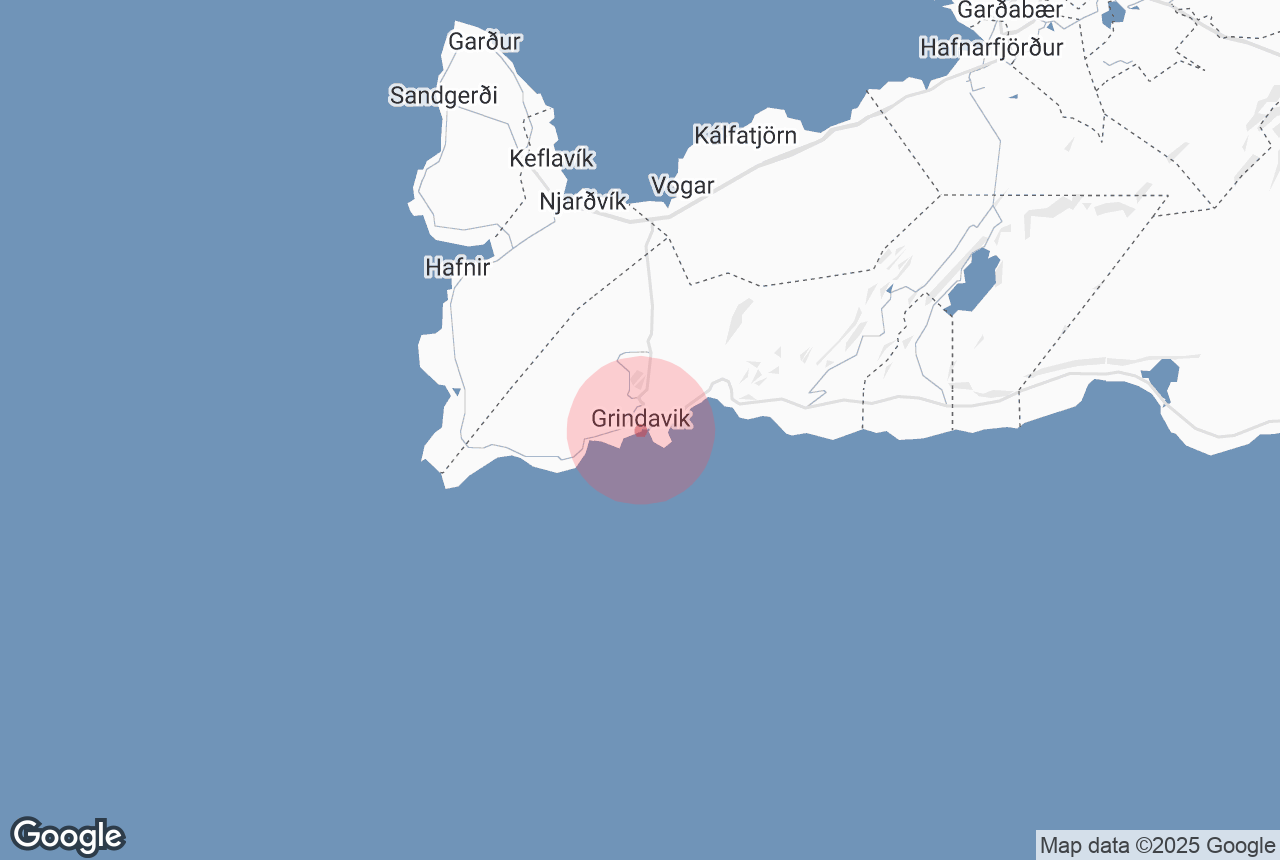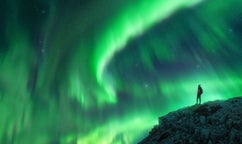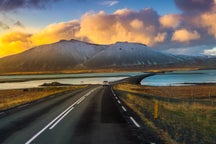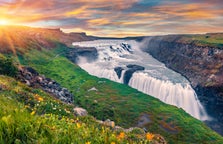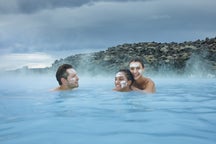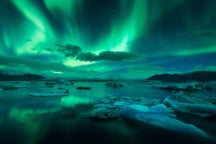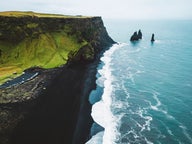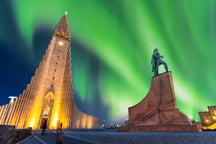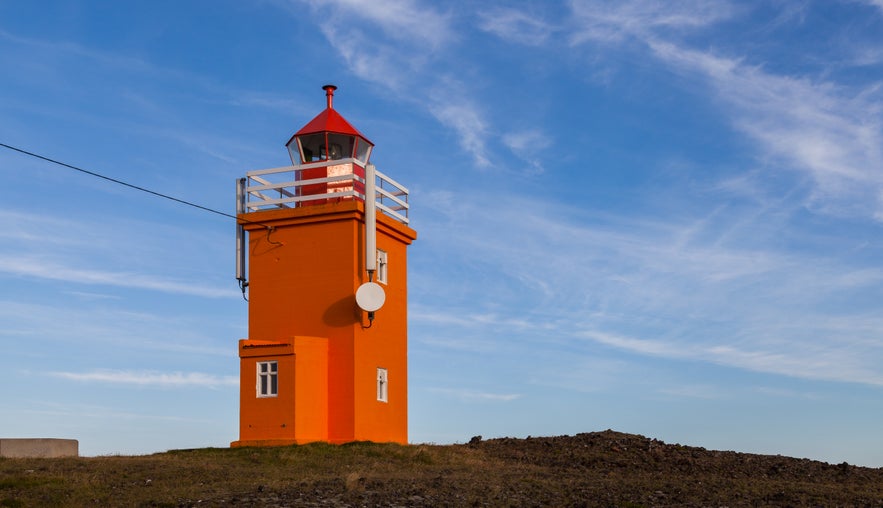
Like visiting the Hallgrimskirkja church, the Viking Village, or the Jon Sigurdsson Museum, a trip to Hopsnes is enriching. The remnants of the old fishing village offer a glimpse into what life was like centuries ago. You can visit Hopsnes through this two-hour ATV Quad Tour.
Hopsnes resulted from an eruption of a row of craters around 2,800 years ago. The lava flowed toward the sea, forming a spit that would become Hopsnes. Today, locals and tourists visit the place to see old structures like buildings, a church, and a famous orange lighthouse, one of its main attractions.
Why You Can Trust Our Content
Guide to Iceland is the most trusted travel platform in Iceland, helping millions of visitors each year. All our content is written and reviewed by local experts who are deeply familiar with Iceland. You can count on us for accurate, up-to-date, and trustworthy travel advice.
Photo above from Wikimedia, Creative Commons, by Diego Delso. No edits made.
What to Expect in Hopsnes Peninsula
Hopsnes peninsula is 1.2 miles (two kilometers) long and 0.62 miles (1one kilometer) wide. The terrain is made of rugged volcanic stones but is passable by vehicles. Hopsnes is largely covered by barren rock.
You’ll see several shipwrecks lying on the ground as you go around the spit. These abandoned shipwrecks happened during the 20th century. You’ll also notice some abandoned houses constantly reminding you of the area’s dangerous waters.
During the early 20th century, Hopsnes was a flourishing fishing village. It had its own harbor, and vessel operations were also dynamic then. Rowing boats and motorboats were also common sights.
However, the fishing operations moved to a different location in 1939 to what is today’s Grindavik harbor. As a result of the transfer, various fishing equipment were left in Hopsnes.
Exploring the peninsula, you’ll find different remains from the old fishing village. These include ice storage, fish storage huts, salt huts, liver processing houses, and fish processing houses.
You’ll also see some old buildings and houses that tell stories of Hopsnes’ interesting history. There’s also a church, a store, and a school, with the church being the oldest structure in the village. It is believed that the church was built in the late 1800s.
You’ll also find different trails that attract hikers and bikers.
But the lighthouse is the most interesting structure in Hopsnes that appeals to most locals and tourists. Built in 1928, the Hopsnes lighthouse’s main is orange, while the tower is bright red. Because of these colors, the lighthouse stands mightily in the middle of the trail like a beacon.
Upon reaching the lighthouse, you can take photos of the structure as its vibrant colors contrast the blue sky above and the rough terrain below. If you go up the lighthouse on a clear day, you’ll see Eldey Island.
If you visit Hopsnes between September and April, you can see the beautiful northern lights at night. The lighthouse’s bold colors and the calming hues of the aurora borealis in the background result in unique views no other place could offer.
Location of Hopsnes Peninsula
The Hospnes peninsula is situated near Grindavik, south of the Reykjaness peninsula. You can reach the lighthouse by foot when coming from Grindavik.
Grindavik is deeply rooted in fishing and remains a bustling fishing town. Moreover, it is home to the Icelandic Saltfish Museum. Saltfish played a crucial role in Icelandic history, as it served as one of the country’s main sources of nourishment during challenging times.
What Makes Hopsnes Peninsula Special?
Apart from seeing the iconic lighthouse, visiting Hopsnes offers a unique experience revolving around history, culture, and nature. Walking around the spit will give you an idea of the power of nature and how it can affect a country and its people.
Interestingly, the spit where Hopsnes stands played a crucial role in the development of Grindavik. During the eruption, the lava flow, and the Hopid lagoon found beside the spit, boosted Grindavik’s port conditions.
Eventually, the sea eroded the lava, moving various loose materials. Without the spit’s presence, Grindavik may not have existed.
Aside from the volcanic history of Hopsnes, its development into a fishing village is another important reason that makes the place special. Seeing the ruins of around 10 shipwrecks evokes mixed emotions of awe and sadness. The same goes for the remnants of the equipment, huts, and other structures.
Lastly, Hopsnes is great for strolling, hiking, and biking. The trails let you enjoy fresh Icelandic air while marveling at the majestic landscapes.
How Can I Get There?
You can get to Hopsnes in three ways: joining a Reykjanes tour, riding a bus, or driving your own vehicle. Taking a tour is the most convenient way of visiting Hopsnes. It also has an experienced guide who will talk about the place’s history.
Nearby Attractions to Visit
After exploring Hopsnes, you can check out nearby attractions equally worthy of your time. About 7.1 miles (11.5 kilometers) from Hopsnes is the Fagradalsfjall volcano. This shield volcano has a peak standing 1,263 feet (385 meters) tall.
Its appealing landscapes earned the nickname “beautiful valley mountain” from the early Icelanders. Interestingly, Fagradalsfjall erupted in March 2021 and again in August 2022. The August eruption lasted three weeks but didn’t cause enough ashfall to disrupt air travel like the 2010 eruption of the Eyjafjallajokull volcano.
Another attraction is the Blue Lagoon, located 6.2 miles (10 kilometers) from Hopsnes. The lagoon is a man-made geothermal spa known for its calming waters that refresh the skin.
The lagoon’s water features a mix of underground geothermal water and fresh water. Moreover, the water is full of algae, silica, and other minerals that help in lifting and toning the skin.
There’s also Brimketill, a coastal rock pool about 9.2 miles (14.9 kilometers) from Hopsnes. Brimketill is made of lava rock and features cone-shaped peaks, geothermal activity, and black lava expanses.
